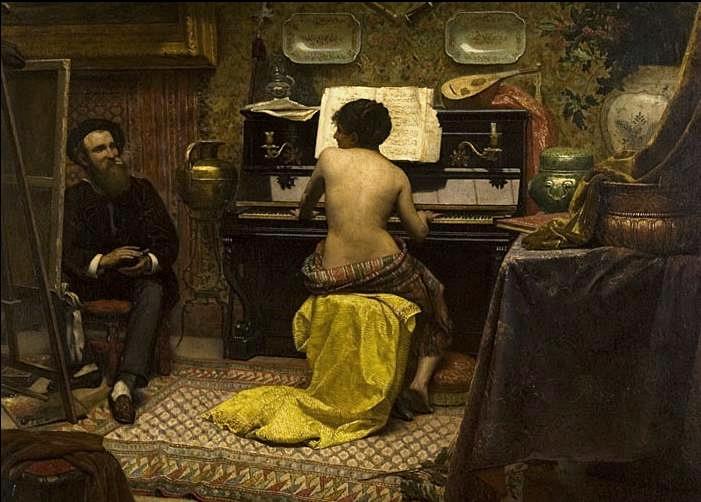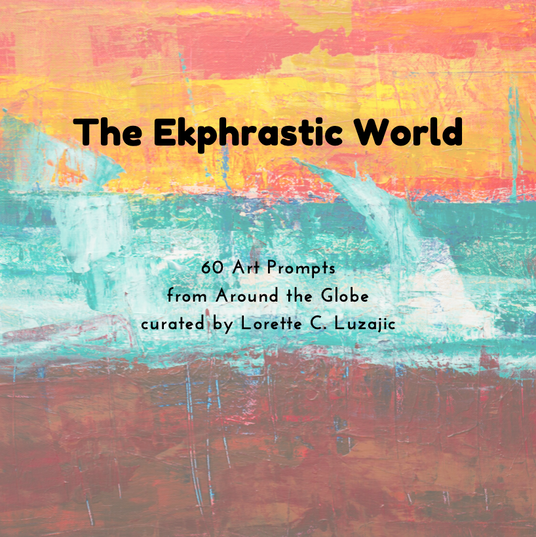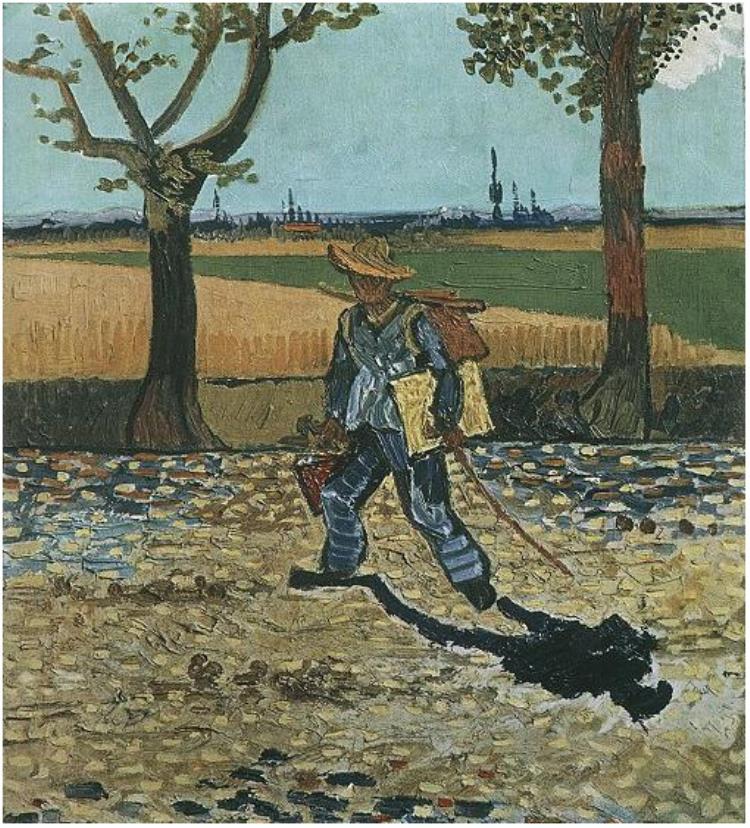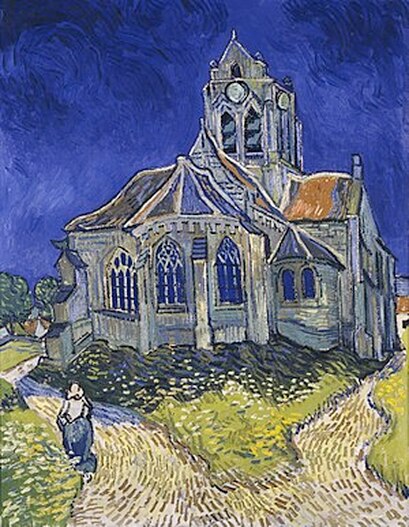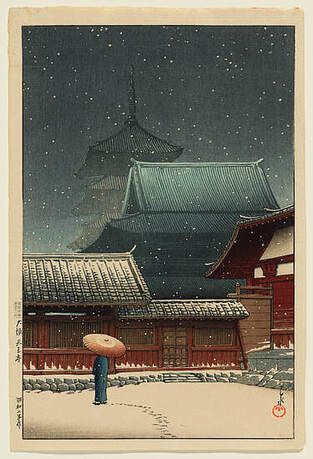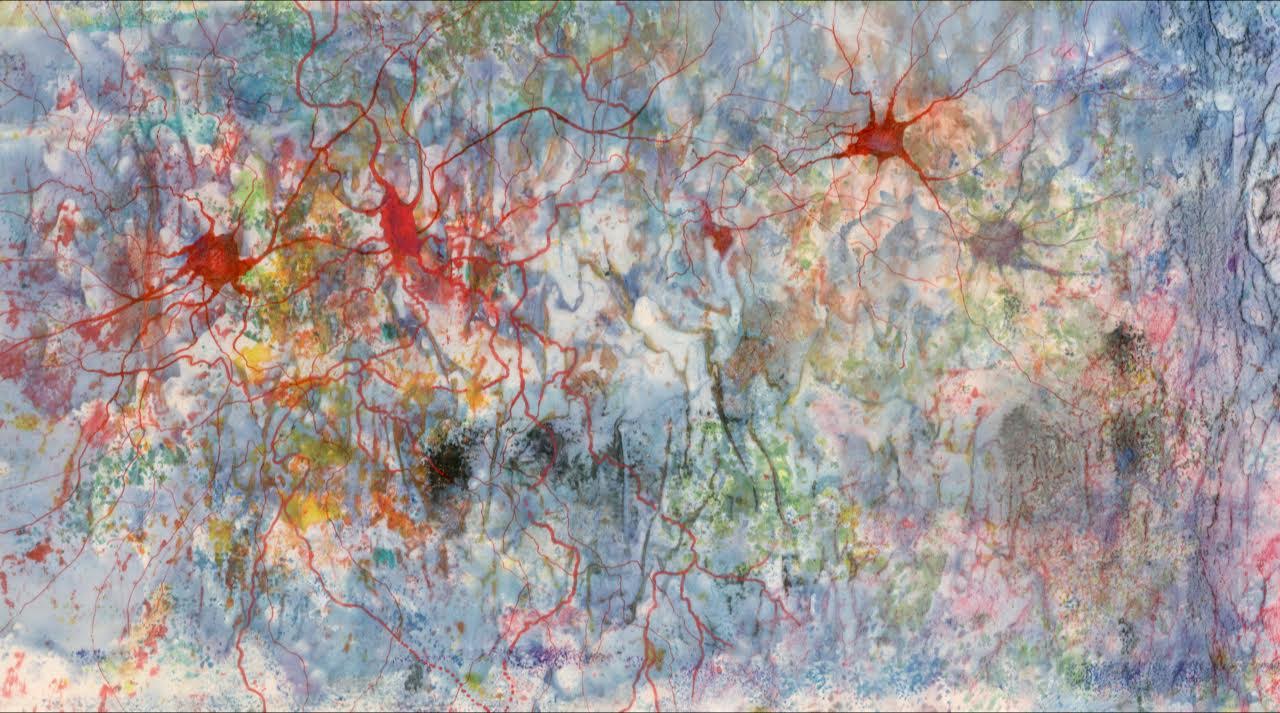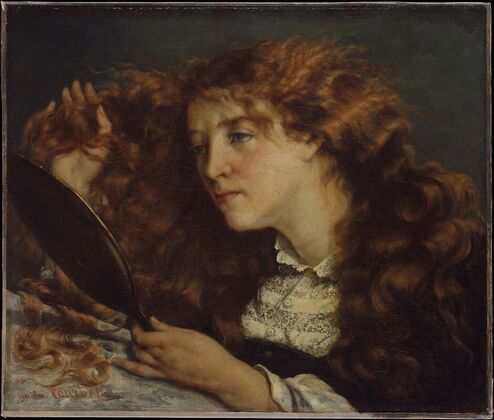|
Join us for biweekly ekphrastic writing challenges. See why so many writers are hooked on ekphrastic! We feature some of the most accomplished, influential poets writing today, and we also welcome emerging or first time writers and those who simply want to experience art in a deeper way or try something creative. The prompt this time is Model's Rest, by Jose Ferraz de Almeida Junior. Deadline is July 10, 2020. The Rules 1. Use this visual art prompt as a springboard for your writing. It can be a poem or short prose (fiction or nonfiction.) You can research the artwork or artist and use your discoveries to fuel your writing, or you can let the image alone provoke your imagination. 2. Write as many poems and stories as you like. Send only your best works or final draft, not everything you wrote down. (Please note, experimental formats are difficult to publish online. We will consider them but they present technical difficulties with web software that may not be easily resolved.) Please copy and paste your submission into the body of the email, even if you include an attachment such as Word or PDF. 3. Have fun. 4. USE THIS EMAIL ONLY. Send your work to [email protected]. Challenge submissions sent to the other inboxes will most likely be lost as those are read in chronological order of receipt, weeks or longer behind, and are not seen at all by guest editors. They will be discarded. Sorry. 5.Include JOSE FERRAZ DE ALMEIDA JUNIOR WRITING CHALLENGE in the subject line. 6. Include your name and a brief bio. If you do not include your bio, it will not be included with your work, if accepted. Even if you have already written for The Ekphrastic Review or submitted other works and your bio is "on file" you must include it in your challenge submission. Do not send it after acceptance or later; it will not be added to your poem. Guest editors may not be familiar with your bio or have access to archives. We are sorry about these technicalities, but have found that following up, requesting, adding, and changing later takes too much time and is very confusing. 7. Late submissions will be discarded. Sorry. 8. Deadline is midnight, July 10, 2020. 9. Please do not send revisions, corrections, or changes to your poetry or your biography after the fact. If it's not ready yet, hang on to it until it is. 10. Selected submissions will be published together, with the prompt, one week after the deadline. 11. Rinse and repeat with upcoming ekphrastic writing challenges! 12. Please share this prompt with your writing groups, Facebook groups, social media circles, and anywhere else you can. The simple act of sharing brings readers to The Ekphrastic Review, and that is the best way to support the poets and writers on our pages!
0 Comments
Happy Birthday to The Ekphrastic Review!
In July, The Ekphrastic Review turns five. To celebrate this milestone, we have compiled a special collection of art prompts from dozens of countries around the world. This special ebook is $20 CAD (approx. $15 USD). It is a gift of support to The Ekphrastic Review, and a collection of 60 art prompts curated to expand and inspire your ekphrastic practice. Everyone who purchases this project can submit 15 poems inspired by the art within, or five short stories or essays, to our upcoming anniversary anthology ebook! From the bottom of our hearts, we thank you for supporting The Ekphrastic Review. Click on image to purchase ebook, or click here. Blank Canvas inspired by Vincent Van Gogh’s painting, Painter on his Way to Work, lost during WW 11 In his baggy blue-grey work clothes and broad-brimmed yellow hat this artist with canvas and tools on his shoulders and under his arm and a prescient black shadow at his feet was surrounded by fields of deep chartreuse and gold a soft pale-green-aqua sky and trees of rusty brown on his way to work in Tarascon walking on a sunlit cobblestone path when he took a sudden wartime detour and nobody knows for sure where he went if he waited out the war hidden in a cave salt mine flak tower** or castle or crumbled in flames during allied bombings was torched along with other art at The Kaiser-Freidrich Museum by retaliating Nazis in retreat or was captured by the Russians and secretly sold and now sits behind a velvet curtain only to be seen in private viewings All we have left is a ghost in a poor photographic image absent the swirling thick signature texture of brushstrokes* but for me he still lives on the walls of museums in the vase of sunflowers’ swirling three dimensional layers of russet, persimmon dark green and gold autumn tones or the blue off-kilter bedroom in Arles with its hanging towel and tilted portraits that perhaps that day he was on his way to paint Joan Kantor * A photo reproduction of this painting exists, but due to the exceptional sharpness and clarity, the authenticity is suspect. It is also in colour, and most reproductions of Van Gogh's work were black and white. It has never been officially discredited. ** large, above-ground, anti-aircraft blockhouse towers in Nazi Germany Joan Kantor’s collections cover such varied topics as art, Alzheimer’s Disease, mental Illness, social justice, and the natural world. Her work took first place for poetry in both The 2013 Hackney Literary Awards and The 23rd Writers Digest Self-Published Book Awards Contests. She performs as part of Stringing Words Together, a violin and poetry duo and also reads her work throughout New England and New York. Joan has also been both judge and mentor in The Sunken Garden Poetry Festival’s Fresh Voices Program. Having always seen the arts as enhancing one another, in her most recent project, Dual Impressions, she pairs original photos with her poems. Eglise D'Auvers In the wind, tongues are grassy with earth, words bounce back, feet stumble over colour like dwarves descended from steeples; a Ferris wheel flows madly in the sun swinging us back to shade, your feet my following, all my purple fragile tragedies; the path rushes out before us, an oven of warm planted bulbs flowing stone, cowslips tugging at our feet; your lips are close to the eaves of that church, my breath the flowers: purple and golden wings of our absolute. Mark B. Hamilton Mark B. Hamilton considers himself a neo-structuralist, working in forms to transform content. Previous poetry includes an award winning chapbook, Earth Songs, a second chapbook, 100 Miles of Heat, and the poetry volume, Confronting the Basilisk. www.MarkBHamilton.WordPress.com Recent work is from Oxford Poetry, UK, Weber—The Contemporary West, North Dakota Quarterly, Chrysanthemum, Urthona Magazine, Stand Magazine, and Duc Le: Bi-lingual Poetry Journal (US/Vietnam), along with a forthcoming poetry volume, OYO, The Beautiful River—an environmental narrative, to be published by Shanti Arts, 2020. Silence Your hush filled the room, not with criticism, but concern. Dignified yet vulnerable your pale countenance covered Manhattan’s burst and blast with a blanket of quiet. I visited you at MoMA at every chance. I imagined your fingers resting gently against my lips seconds before they touched your own. I suppose I fell in love with you a little bit. Last time I perused those aesthetic walls, you weren’t there. Your absence a gong in my heart, sounds of car horns angry in my soul. It’s your stillness I remember—how, like a shade, you slipped away even when you were there. Charlie Brice Charlie Brice is the author of Flashcuts Out of Chaos (2016), Mnemosyne’s Hand (2018), and An Accident of Blood (2019), all from WordTech Editions. His poetry has been nominated for the Best of Net anthology and twice for a Pushcart Prize and has appeared in The Atlanta Review, The Sunlight Press, Chiron Review, Plainsongs, I-70 Review, Mudfish 12, The Paterson Literary Review, and elsewhere. Divining the Layers Lamina, the name for sedimentary rock thin as paper, paper similar to the sheets of my architect’s sketches, sketches of façades and walls and interior spaces, spaces demarked by gradations, levels, or layers, layers similar to those found in the tissue of plants-- plants with dermal, ground and vascular strata: strata of bodies—heart, skin, and blood cells, cells communicating or not—the unordering neurons, neurons in my son’s brain underneath skin and skull, skull cupping labyrinth of fatty acids where cells fire, fire into subclinical seizures—data we capture and print, print on paper or study under microscopes or paint, paint in a rainbow of colours on a surface thin as lamina. Christine Stewart-Nuñez Christine Stewart-Nuñez is the author of Postcard on Parchment (ABZ Press 2008), Keeping Them Alive (WordTech Editions 2010), Untrussed (University of New Mexico Press 2016), and Bluewords Greening (Terrapin Books 2016), winner of the 2018 Whirling Prize. She is a Professor in the English Department at South Dakota State University and the South Dakota Poet Laureate. Find her work at christinestewartnunez.com. Jo Hiffernan: La Belle Irlandaise Who in her right mind wouldn’t trade Symphony in White, No. 1: The White Girl for the candor of L’Origine du Monde? Or the chance to entwine milky limbs with Helène Clareaux under Prussian blue canopies, pearls spilling across pink sheets, portrait vase agape with roses, ivorine hair combs loose in the bedclothes? When Whistler saw Courbet’s finished canvas, he dropped you for the parlour maid, but you arranged to keep their son for yourself and your hand in the business. Years later, Freer remembered you at Whistler’s funeral, “…I saw the thick wavy hair…although it was streaked with gray, I knew at once it was Johanna,… ‘la belle Irlandaise…’ ” come to pay her last respects. You remembered how Whistler and Swinburne dismissed you as “soft snows that hard winds harden.” But not Courbet, who caught you with that cascade of russet in one hand and a mirror in the other—no comb, no reflection, just your sensible gaze, appraising eye, self-possessed, ready. Kate Fox Kate Fox's work has appeared the New OHIO Review, Great River Review, KROnline, Pleiades, and other literary journals, and she has published two chapbooks: The Lazarus Method through Kent State U Press, and Walking Off the Map through Seven Kitchens Press. She lives in Athens, Ohio, with her partner, Bob DeMott, and two English Setters. The Agapanthus Triptych “There are Frenchmen who fight, I can only paint.” Claude Monet, 1916 Every day trains rumbled at the edge of the garden, carrying the troops in, bearing the bodies out. He painted the agapanthus, the water lilies their solace, this sanctuary. Always it is about light—the way it bends, shifts diffuses to catch for an instant the ephemeral set it down, as if to hold it -- that moment of seeing. All foreground, no horizon a luminous lily pond wrapped in calm cobalt blue and violet, viridian green. Mist and vapors drift on the surface, brilliant blossoms seem to swing into air overhead. In the centre on a lily pad, sudden dabs of vermillion red. In the end he painted them out. The agapanthus disappear under layers -- emerald and cadmium-yellow brush strokes, dense packed reeds and grasses. We have the lilies, the reflected sky, clouds hovering over, shadows of willows, racketing trains, the water bearing it all. Sigrun Susan Lane Sigrun Susan Lane is a Seattle poet. Her poems poems have appeared in a number of regional and national publications including Arnazella, Albatross, Bellowing Ark, Blue Collar Review, Cascade, Chrysanthemum, Crab Creek Review, Cirque, Duckabush, Hubbub, Floating Bridge Press Vol. # 4, 5, 6, 7, JAMA, The Mom Egg, Malahat Review, Melusine, Passager, The Poeming Pigeon, Pontoon # 10, Rain City Review, Raven Chronicles, Sing Heavenly Muse, Seattle Review, Stringtown and Still Crazy. She has have received awards for poetry from the Seattle and the King County Arts Commissions. She has published two chap books from Goldfish press, Little Bones and most recently Salt in 2020. She is a docent at the Frye Art Museum in Seattle Washington. Lovers after Lovers, Andrew Wyeth (USA) 1977 There is love here, yes. Beneath every brushstroke pulses a heartbeat born out of the curve of your hip, the heft of your breasts uplifted by pulled back arms, the apple-firm fullness of your set lower lip, the subtle thorns of lashes framing your crystalline eyes. Yes, there is love here. Though I have never touched you save for the light pressure of my palm upon your shoulder, a gentle repositioning to catch the shifting sunlight streaming through the window of our secluded studio, I know every secret your body withholds from the world, and I love them all. But when I realize that I am beginning to love the way I see myself reflected in the universe of your pupils, a crow hanging—wings outstretched—in a moonlit sky, I instruct you to turn your head and look away from me. ** Overflow after Overflow, Andrew Wyeth (USA) 1978 I cannot allow the darkness in, though it waits just outside the window like the eyes of all those who would not approve of my time alone with you. I try to focus on the light, the way it glows upon your supine form stretched across a narrow bed barely big enough to hold your body alone. But with each dappled stroke, the brush in my hand transforms you into a marble graveyard angel toppled by the weight of sunlight and too many lonely years to count. ** Day Dream after Day Dream, Andrew Wyeth (USA) 1980 I try to imagine the fragrance of your sleeping breath on my face as it departs your body, the shadow of a flower dream in which you pick daisies to weave into a crown that ordains you queen of a kingdom hidden from outsiders where I am your subject and you are mine, but the breeze that blows through the open windows billows and fills the sheer barrier that separates you from me. Kip Knott Kip Knott is a past contributor to The Ekphrastic Review. His work has also recently appeared or forthcoming in The American Journal of Poetry, Flash Fiction Magazine, La Piccioletta Barca, and Typishly. His book of poetry, Tragedy, Ecstasy, Doom, and so on, is due out later this year from Kelsay Books. More of his work can be accessed at http://www.kipknott.com. St. James Years ago you weaved between office chairs and desks in a dull janitor’s uniform, gathering trash, unseen but not unseeing, your mind on the divine. In what they discarded, you made divine. Crafted an altar from their in between, fearing not the trappings of their desks, for even in what they trashed you saw the holy, a spirit that never dulls. The purple paper has faded to dull brown, but your creation is still divine, old furniture and cardboard carved and gilded, the trash unrecognizable, beckoning what’s between our world and the next. Leave your desks and come see! Fear not. My office desk is not revered, crossed only with dull scratches from lunches eaten at a desk instead of outside, among the divine. Now I stand between two museumgoers who only see trash, don’t understand why you would use trash, because it’s not what they picture between the pages of art books. Yet their reaction can’t dull the divine or dim the glow off a foil-draped desk. But you never stopped by the desks of your coworkers, or left just one note in the trash to draw them to the divine. In all your years of creation, not once. Maybe you were afraid they’d find it dull, or that they would turn away as you leaned between their divine desks, between the trash, to whisper in their ears, our lives are not dull. Victoria Markovitz Victoria Markovitz studied poetry at the University of Maryland's Jiménez-Porter Writers’ House. Her work has been published in Little Patuxent Review, and she recently won the The Creative Scavenger hunt hosted by MoonLit and Ink Press Productions. She currently works as an editor in Washington, D.C. |
The Ekphrastic Review
COOKIES/PRIVACY
This site uses cookies to deliver your best navigation experience this time and next. Continuing here means you consent to cookies. Thank you. Join us on Facebook:
July 2024
|
